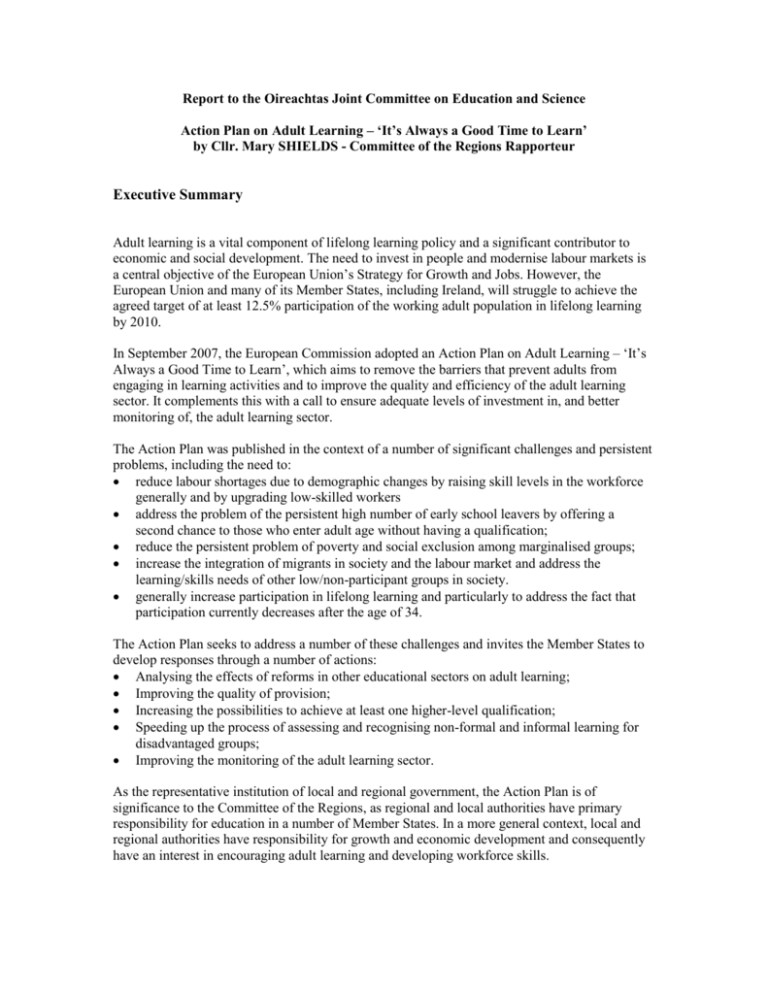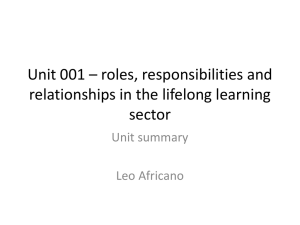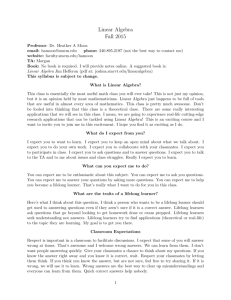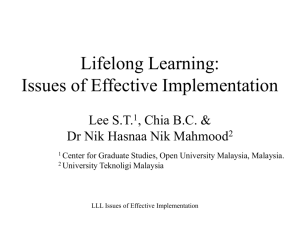Presentation on the findings of the report entitled `Action plan on
advertisement

Report to the Oireachtas Joint Committee on Education and Science Action Plan on Adult Learning – ‘It’s Always a Good Time to Learn’ by Cllr. Mary SHIELDS - Committee of the Regions Rapporteur Executive Summary Adult learning is a vital component of lifelong learning policy and a significant contributor to economic and social development. The need to invest in people and modernise labour markets is a central objective of the European Union’s Strategy for Growth and Jobs. However, the European Union and many of its Member States, including Ireland, will struggle to achieve the agreed target of at least 12.5% participation of the working adult population in lifelong learning by 2010. In September 2007, the European Commission adopted an Action Plan on Adult Learning – ‘It’s Always a Good Time to Learn’, which aims to remove the barriers that prevent adults from engaging in learning activities and to improve the quality and efficiency of the adult learning sector. It complements this with a call to ensure adequate levels of investment in, and better monitoring of, the adult learning sector. The Action Plan was published in the context of a number of significant challenges and persistent problems, including the need to: reduce labour shortages due to demographic changes by raising skill levels in the workforce generally and by upgrading low-skilled workers address the problem of the persistent high number of early school leavers by offering a second chance to those who enter adult age without having a qualification; reduce the persistent problem of poverty and social exclusion among marginalised groups; increase the integration of migrants in society and the labour market and address the learning/skills needs of other low/non-participant groups in society. generally increase participation in lifelong learning and particularly to address the fact that participation currently decreases after the age of 34. The Action Plan seeks to address a number of these challenges and invites the Member States to develop responses through a number of actions: Analysing the effects of reforms in other educational sectors on adult learning; Improving the quality of provision; Increasing the possibilities to achieve at least one higher-level qualification; Speeding up the process of assessing and recognising non-formal and informal learning for disadvantaged groups; Improving the monitoring of the adult learning sector. As the representative institution of local and regional government, the Action Plan is of significance to the Committee of the Regions, as regional and local authorities have primary responsibility for education in a number of Member States. In a more general context, local and regional authorities have responsibility for growth and economic development and consequently have an interest in encouraging adult learning and developing workforce skills. The Committee of the Regions’ opinion: (a) Believes that the Action Plan has the potential to develop the adult learning sector, to open up accessibility of learning to certain non-participant groups and in a way that respects the diversity of learning traditions. (b) Recognises that the Commission has addressed the concept of adult learning in a sensitive manner and taken a broad approach to what constitutes adult learning. (c) Highlights that there are no easy and quick solutions in increasing participation of non/low participation or excluded societal groups in adult learning. What is necessary is a change of mindset and an attitudinal shift embedded across society. (d) Welcomes the references throughout the Action Plan to the importance of partnership and the capacity of authorities to mobilise national institutions and stakeholders at all levels, including at local and regional levels, through learning partnerships. The credibility of lifelong learning strategies depends on linking them to policy measures. (e) Suggests that, in ensuring the delivery of an adult learning service and the objectives of the Action Plan, the issue of finance and funding remains critical and more could be done on providing sustainable funding for adult learning, by the public and private sectors. (f) Recommends that in the interests of cost-effective provision, better use could be made of second level schools and other public resources (such as libraries) for adult learning. (g) Highlights that exclusion from, and non participation in, the learning process constitutes a significant first step towards marginalisation, which is often followed by patterned ‘exclusion’ from employment, civic and cultural life. It proposes that a sustained integrated approach is necessary to re-dress this and nurture a culture of learning. Points out that: - This requires recognition of the diverse abilities and learning experiences of potential adult learners; - A need to enhance the participation of older persons in particular and to challenge the myths and stereotypes regarding older adult learning; and To provide and use appropriate learning opportunities and learning materials and to be careful not to have an over-reliance on ICT and other new technologies. (h) In developing an efficient adult learning sector, it emphasises the need to address the fact that the adult learning sector is not well researched and that work should be undertaken on: - Factors influencing participation/non-participation in adult learning in Europe; European learners’ motivational reasons, learning styles and attitudes to learning; Returns on investment in engagement in adult learning; and Perceptions of low participating target groups on learning. (i) The emphasis on improving the quality of the adult learning sector is welcomed and in particular the professionalisation of adult learning personnel. These people are the pivot around which policy rhetoric is made into learning practice on the ground. The identification of good practice at European level on professional development will be a useful contribution in improving quality. (j) Finally, the ‘one-step-up’ approach is considered to have the potential to have a very positive effect on motivation and a learner’s continued participation in a life-long process. An important element for many adult learners is the personal feeling of self-fulfilment and wellness associated with success in learning and the ‘one-step-up’ approach will help in this regard.











